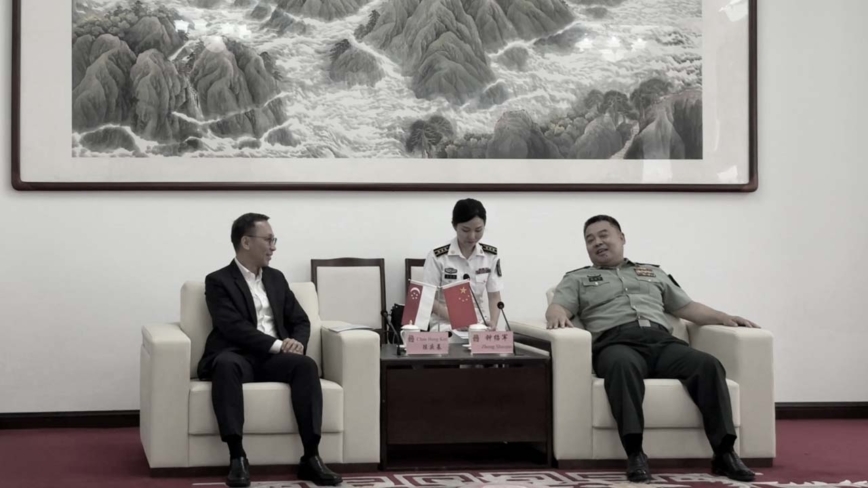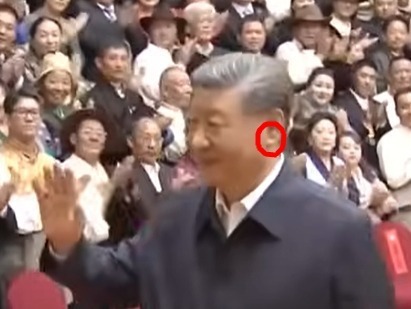In August 2025, Zhong Shaojun (right), the political commissar of the National Defence University of the Communist Party of China, met with Chan Heng Kee, the Permanent Secretary of the Ministry of Defence of Singapore, during his visit. (Source: Singapore Ministry of Defence Facebook)
[People News] Singapore's Lianhe Zaobao published an article on August 19 mentioning an official who has rarely been seen in public—Zhong Shaojun—but did not include a photo of him. Zhong's photo first appeared on the Facebook account of Singapore's Minister of Defence and was subsequently reposted by the Wall Street Television x account.
1. The 'Reappearance' of Zhong Shaojun
On August 19, the Singapore Ministry of Defence announced on Facebook that Chan Heng Kee, the Permanent Secretary of the Ministry of Defence, visited Beijing from August 18 to 19, where he met with several officials, including Dong Jun, the Minister of National Defense of the Communist Party of China, Xu Qiling, the Deputy Chief of Staff of the Joint Staff Department, Yang Xuejun, the President of the Military Science Academy, and Zhong Shaojun, the Political Commissar of the National Defense University. The post included multiple photos from the meetings.
Zhong Shaojun has been a close aide to Xi Jinping during his time in Zhejiang, Shanghai, and at the central government. In June 2013, Zhong, who had no prior military experience, was appointed as Deputy Director of the Central Military Commission Office and Director of the Office of the Chairman of the Central Military Commission, receiving the rank of Colonel. In March 2024, he was unexpectedly removed from his roles as Director of the Central Military Commission Office and Director of the Office of the Chairman of the Central Military Commission. There are widespread rumours that he will assume the position of Political Commissar at the National Defence University, although this has not been officially confirmed.
The photos reveal that the body language of Zhong Shaojun and Chen Qingji, the Permanent Secretary of the Singapore Ministry of Defence, has been interpreted by some as arrogant or impolite, though it may carry other meanings as well. In this context, Zhong Shaojun is in his own territory and adopts a relaxed posture during discussions with foreign representatives, which reflects the confidence derived from his advantageous environment. In contrast, Chen Qingji's hands are clasped in front of his abdomen, forming a closed loop; this posture is often seen in psychology as a defensive or self-protective signal, suggesting that the conversation's content is somewhat pressuring for him.
Looking further at the direction of their feet, one of Chen's feet points towards Zhong Shaojun, indicating a psychological inclination to approach and showing a willingness to cooperate. Meanwhile, one of Zhong Shaojun's feet is directed towards his left side, suggesting an inner tendency to leave, possibly indicating a desire to conclude the conversation quickly.
During his interaction with the Chinese Minister of Defence, Dong Jun, Chen Qingji's hands remain in front of his abdomen, indicating that his defensive mindset has not been entirely dispelled; however, one foot still points towards Dong Jun, continuing to signal cooperation. Dong Jun, in contrast, adopts a natural posture with his hands and legs apart, which is characteristic of confidence and acceptance, with one foot directed towards Chen, further implying an intention for active communication and maintaining a cooperative space.
As Singapore's Chen Qingji seeks collaboration with China, he must engage with the relevant field supervisors. Therefore, it can be speculated that Zhong Shaojun's presence may suggest that he secretly oversees military surveillance or commands psychological warfare within the military.
It is said that Zhong Shaojun became Xi Jinping's most trusted aide because he once shielded Xi from a bullet, which remains lodged in his body to this day. Additionally, Zhong possesses a unique skill; he holds a master's degree in psychology and excels at eavesdropping, a talent that fulfils Xi Jinping's desire for control over others.
2. The U.S. RAND Corporation Studies the CCP's Psychological Warfare
In 2023, the U.S. RAND Corporation published an article titled 'The Next Generation of Psychological Warfare by the CCP—Military Applications of Emerging Technologies and Their Impact on the United States.' The article asserts that the CCP considers psychological warfare to be one of the key components of modern warfare, primarily focusing on manipulating information to influence the decisions and behaviors of adversaries.
The U.S. military is increasingly attentive to the CCP and is preparing for potential conflicts between the U.S. and China. This underscores the importance of understanding the future trajectory of the CCP's psychological warfare capabilities and their implications for the CCP's strategic actions during crises or conflicts. The article delves into the CCP military's perspectives on the next generation of psychological warfare. The CCP is keen on leveraging advanced computing technologies, such as big data and neuroscience, aiming to apply these innovations in military contexts to enhance its psychological warfare capabilities.
There are three potential futures for the CCP's psychological warfare:
First, to position information manipulation at the forefront of national strength. Second, the CCP military plans to utilise emerging technologies to predict or influence the decisions of adversaries. Third, a lack of imagination could result in the perpetuation of the current state of the CCP's military capabilities.
This situation presents a risk: if the Chinese Communist Party (CCP) realises that its psychological warfare has not produced the desired effects, Beijing may respond in unpredictable ways. In simple terms, the United States believes that the CCP's psychological research is lacking, and if they make a mistake in judgment, they could act out of desperation.
American psychological research is characterized by a comprehensive disciplinary system, theoretical innovation, technological leadership, extensive applications, and strong international influence. American think tanks assess the CCP's psychological capabilities as competent.
3. New Technologies of the CCP Render Individuals Invisible
Media figure Liu Zheng has revealed that Zhong Shaojun will take on the role of director of the General Political Department. He also disclosed that the CCP's National Security Commission's operational base consultation management centre has the capability to erase all information about any individual from the internet.
Liu Zheng further explained that the major big data storage centres are located in three main bases: Guizhou, Shenzhen, and Shanghai. Despite having these three big data storage centres, the CCP remains unsatisfied, as they aspire to establish a top management centre capable of achieving network control within Beijing in just one second.
Consequently, in the Fengtai District of Beijing, a certain commercial building has been officially acquired and repurposed into a new core management base for data storage and control at the highest level. This top-tier management core base is called the 'Information System Management Centre of the CCP's National Security Commission Operational Base.' Utilising this base, the CCP has initiated grid management of the global Chinese diaspora and its 1.4 billion citizens. No matter where individuals are located, their browsing and property information will be monitored in real-time by the CCP.
On mainland Weibo, a prominent user shared a photo of Chen Qingji (Chén Qìngjī) meeting with Dong Jun (Dǒng Jūn), Xu Qiling (Xú Qǐlíng), and Yang Xuejun (Yáng Xuéjūn) from the Singapore Ministry of Defence, but notably absent was Zhong Shaojun (Zhōng Shàojūn).
When searching for Zhong Shaojun's name on Weibo, the result is: 'Sorry, no relevant results found.' In contrast, Xu Qiling and Yang Xuejun can be found without issue.
This raises the question: with Zhong Shaojun's disappearance and the internet showing no trace of him, could he be intentionally orchestrating this to enhance his safety and evade surveillance? On the other hand, the revelation of the mysterious Yang Lanlan (Yáng Lánlán) incident—could this also be the work of another faction aiming to exert pressure on Xi Jinping (Xí Jìnpíng) to resign?
Psychology has its roots in philosophy, which in turn is derived from religion. Xi Jinping appears to be seeking to monitor the populace through modern technology and scientific psychology, instilling fear and securing loyalty to fulfil his governing ambitions.
(First published by People News) △











News magazine bootstrap themes!
I like this themes, fast loading and look profesional
Thank you Carlos!
You're welcome!
Please support me with give positive rating!
Yes Sure!